The Power of Support
Transgender Allyship Collective creates a new narrative for increasing allyship in Houston.

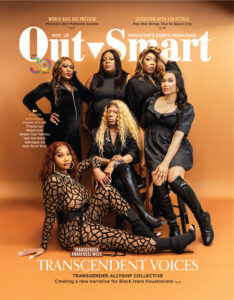
Transgender Awareness Week, celebrated this year November 13–19, is a week-long commemoration devoted to uplifting and remembering the lives of transgender people, leading up to Transgender Day of Remembrance on November 20. Because transgender people have a much shorter life expectancy, we find that our memories are often stories of despair arising from a hostile societal climate and political warfare against the bodies of transgender people.
One coalition of Black transgender women is creating a new narrative for themselves and the people with whom they interact. Though this program was originally developed with community organizers and organizations, it has been transformed through the lens of the people who have lived through their own transition and have their own perspectives on what change can look like for themselves. They range from activists to performers and everything in between, with a common bond of being Black transgender women.
Transgender Allyship Collective (TAC) is a program led by Joelle Espeut, the program director at The Normal Anomaly Initiative. Espeut has been instrumental in creating courageous, braver spaces for Black transgender women since she landed in Houston from Los Angeles six years ago. In this capacity, she has helped create a day celebrated in Houston on November 14: Transgender Allyship Day. The day is centered around finding collective, proactive, and communal ways to uplift the identities of those silenced and overlooked in mainstream queer agendas. Through this, ten women have become a part of a coalition that is based on sisterhood and develops training for people interested in being better allies to this community.
From this emerged a group of nontraditional activists who are a part of this coalition of Black transgender women seeking to change the narratives and create allyship for their community in Houston and beyond. Their insights into the process of creating a supportive world starts with their stories of power that highlight the beauty of being Black and transgender in Houston.
As we celebrate Transgender Awareness Week, stories like these show us how incredibly life-changing allyship and support can be for persons who live at the margins. These stories of resilience and sisterhood promise that, through allyship, everyone can become their own success story. The sisterhood of the Transgender Allyship Collective—though it was created to advocate for Black transgender women’s well-being—has created narrative-shifting components internally that are rarely found within such groups in the South. TAC’s emerging activists who have transitioned in Houston have found, in multiple ways, what all Houstonians know to be true: Houston is a city of possibilities—for all of society.
Joelle Espeut
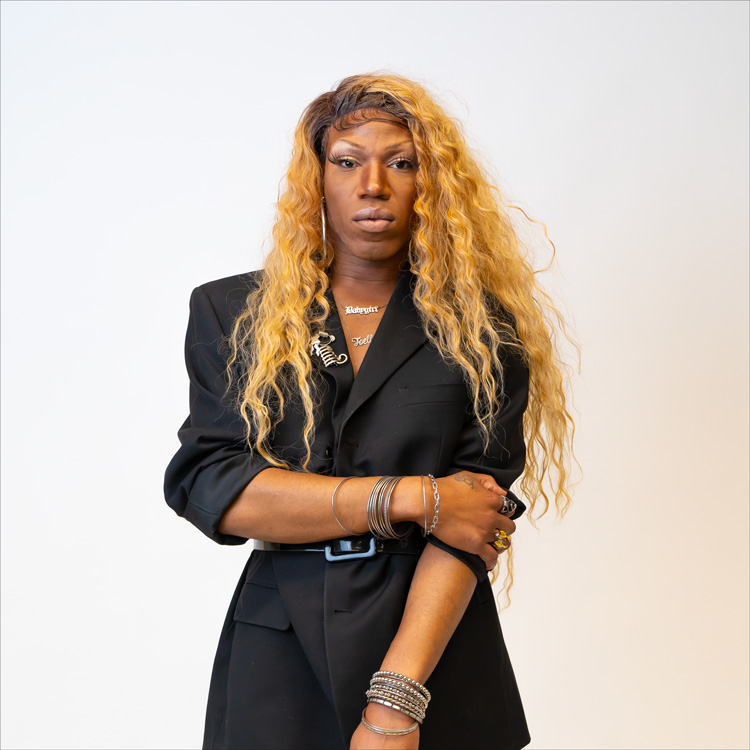
Joelle Espeut is the brainchild of this coalition endeavor. Having the experience of living in multiple cities as she grew more into herself, she came to Houston in hopes that she could find more like-minded people, especially a community of transgender women. “Black trans-ness is a spectrum, and representation is often singular and mostly rooted in trauma, struggle, death, and despair. I knew that we were more than that. We are the person passing you on the street, your co-worker, your sister, and not just something referred to when you are centering body parts, picking us apart or sexualizing us.” With this, she journeyed into advocacy work that is rooted in connection and community while centering joy.
“Allyship is not just outside of your identities; allyship can
be centering communities you are a part of, too.” —Joelle Espeut
Joelle knows all too well what it is like not just to find allyship in the greater society, but to also find allyship among people who identify just like her. Her friend Kaliyah, also a Black trans woman, helped her find her womanhood while she was still living in Los Angeles. Her friendship made the transition seem effortless and without the burden of perfection. “She didn’t force me to look like anyone or anything. I had the power to be the woman I desired without the fear of being shunned. She made it safe for me to experiment.”
This is a part of what Joelle is now doing for women in Houston: encouraging her sisters to engage in their whole selves, to think expansively even in challenging spaces, and to not let trauma be the only way they communicate. “Allyship is not just outside of your identities; allyship can be centering communities you are a part of, too,” she says.
Taylor Rose Mabrie
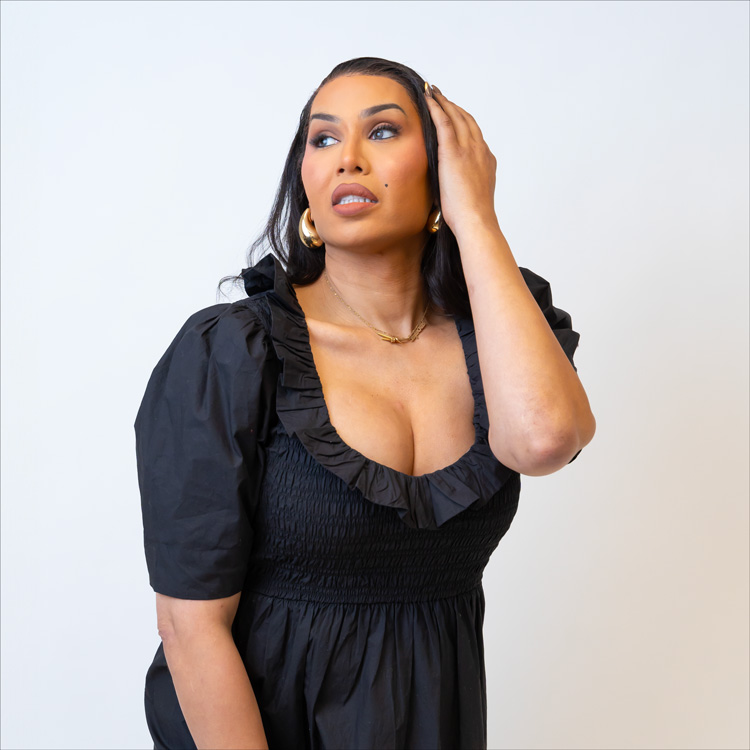
Taylor Mabrie never wanted to be anyone other than Taylor—even though she was introduced to the community as her entertainment persona, Chloe Ross. As early as 8 years old, Taylor can remember taking her mom’s outfits, stockings, and shoes to create fashion shows in her room. Yet, it wasn’t until the COVID-19 shutdown that she began her transition.
“I became depressed,” she recalls, “and was having conversations with my chosen mother, Tommie Ross, about feelings that I knew were always there. She gave me the knowledge to feel comfortable moving forward with who I always was.”
Taylor began to secretly transition, taking months before she presented as her whole self. Her biggest ally throughout her life was her dad, and his understanding was the catalyst to finding comfort in showing the world who she was. Since then, transitioning has been overwhelmingly positive, and she spends her time educating and informing people about this newfound liberation. Though there are still a lot of obstacles transgender people are facing, Taylor is resolute in contributing her story to the fabric of the world, and emphasizing that transitioning doesn’t change you, it just empowers your authenticity. “Trans people don’t want special treatment,” she says. “We want to be treated as humans. Respect doesn’t require agreement.”
Christen “Coco” Valentine
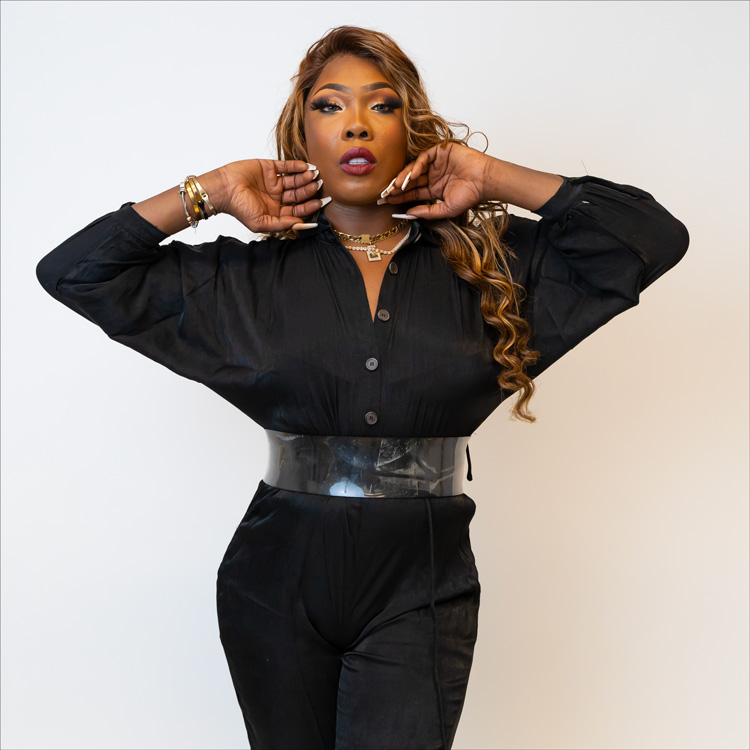
“We are here and we are not going nowhere,” declares Christen “Coco” Valentine. Coco is a vibrant Black trans woman who has called Houston home since moving from Detroit ten years ago. Houston represents a brighter future for her as she expands the freelance makeup artistry she has done since she was young, adding creative direction for music videos and professional nonprofit work to her résumé in the process. Living a more stable life is the reality that she has always fought for. “Society is not this big idea; it is where we all live. I don’t get a discount for being trans, so there is no need to treat us as less than any other human being.” The society in which Coco transitioned helped to shape her love for beauty. Some of her first allies who brought her into the sisterhood were her clientele of mostly exotic dancers and performers.
Coco still uses her connection to beauty and video production in hopes of changing the narratives of her community. Before her video Pose, there were few powerful Black transgender actors on the screen. She believes that seeing people on the screen who look like you, and who you can identify with, not only gives you a possibility model, but it can change the way people view Black trans women. “We need more writers, directors, and producers to put us more in the lights of the camera, telling our diverse stories,” she says. “This is one of the main ways we can be more accepted.”
B’Yancha Foxx
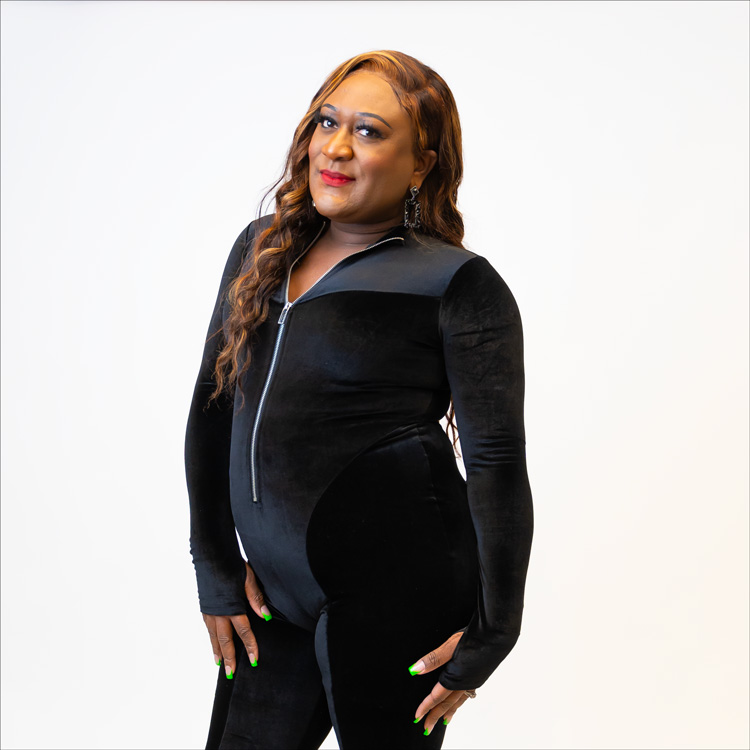
Some stories don’t start with beauty, but most stories—with the right support—can end up beautiful. B’Yancha Foxx has been sober from methamphetamines for four years. She was introduced to the drug while doing sex work. Some studies show that about 67 percent of trans people engage in sex work because of lower education status, homelessness, and perceived social support. By leaving the sex-work industry and getting into recovery, she has found the strength and courage to become a recovery-support peer specialist who focuses on the transgender population.
“Visibility is important because we need to be seen and heard for our trans siblings.” —B’Yancha Foxx
Activism only recently became a goal for her, as her focus had been just helping people who were in her former situation with the services needed to empower them to make the best decisions for themselves. She remembers the people who were visible before she had the courage to follow their example. “Visibility is important because we need to be seen and heard for our trans siblings,” says B’Yancha. Though she doesn’t consider herself on the front lines yet, she is actively working with her sisters to find that confidence. “With the support of the girls,” she says, “I am finding myself growing into my goals and surpassing them.”
Mikayla Poche
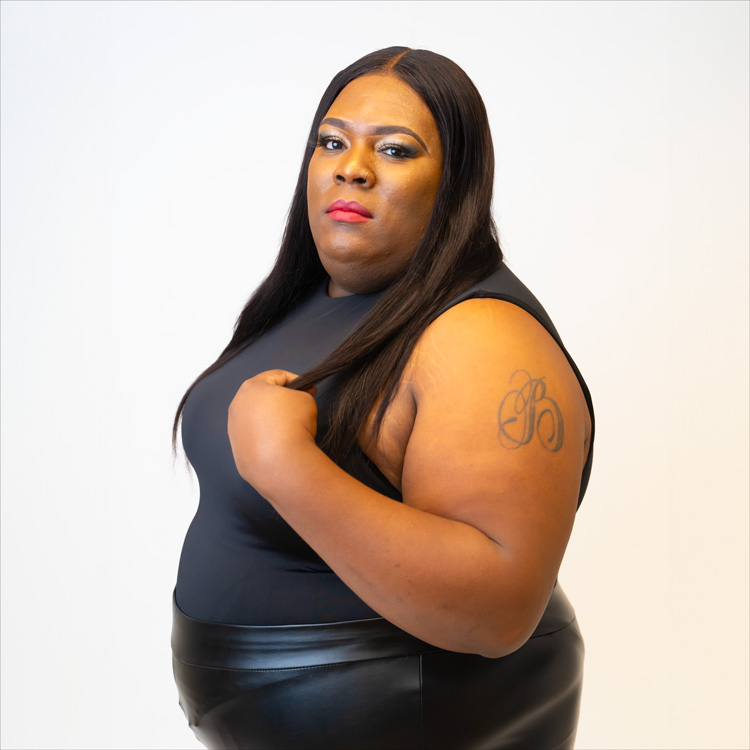
Mikayla Poche’s mother is one of her biggest supporters, and having her as an ally has made her transition quite effortless. Her mother supported her move from Baton Rouge to Houston in search of a better life. “Houston has shown me so much love and support,” Mikayla says. “I came here with very little, and now I have jobs, my own car, and an apartment.” Though 34 percent of Black transgender people are said to make under $10,000 a year, Mikayla—like many of the women of TAC—has found that having a great support system is one of the most important catalysts to a better life for this consistently marginalized group.
“We know we can help others see that we are just like them: human.” — Mikayla Poche
To her, activism and allyship go hand in hand: it is about support, being comfortable listening to stories that are not like yours, and speaking up for those who have been silenced. Sometimes, it is as simple as supporting one’s decision to be more of themselves—much like her mother. The support and sisterhood of TAC has helped her to realize that love and compassion have to start from the inside first. “Being a part of this is eye-opening—to see us as Black trans people listening, supporting, and uplifting each other,” says Mikayla. “Because we truly see it for ourselves, we know we can help others see that we are just like them: human.”
Sasha “Barbie” Moore

Sasha Moore has been active in the Houston community and has been showing up unapologetically herself for over a decade. Her beauty and tenacity have garnered a following that listens to her and regards her as an expert connector. Notably, she appears regularly on the Isaiah Factor Uncensored television program, giving updates about pop-culture topics. Her story of allyship started with finding the beauty within by building a community of supporters as she endeavored to show up in power, confidence, and glamor in all the spaces in which she interacts.
Sasha found herself in this TAC group through wanting more spaces to understand and embrace the journey of being a Black transwoman. These community connections have allowed her to have a deepened understanding of the multiple intersecting identities and experiences across the transgender spectrum. Through this, she has become an advocate of allyship that displays connection and collaboration.
For more info about Transgender Allyship Collective (TAC), visit
www.normalanomaly.org/transgender-allyship-collective.











FB Comments